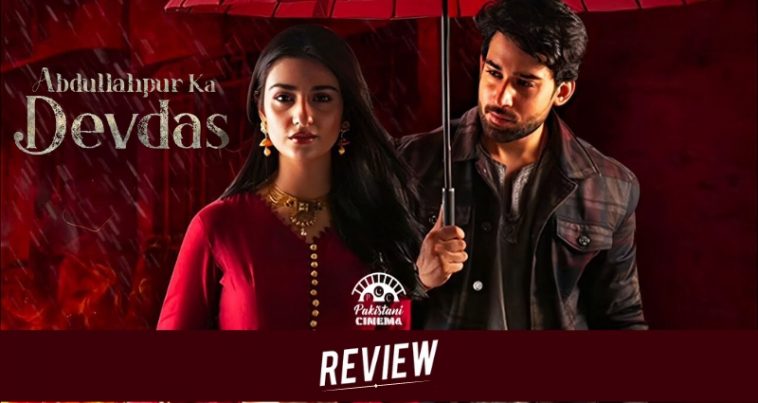A Pakistani series made for Indian television. I never thought this sentence could exist but here we are. ‘Abdullahpur Ka Devdas’, a Pakistani production has landed on Zee Zindagi and will stream on YouTube, twice weekly, for Pakistani audiences. The first two episodes of the 13-episode series just dropped and left me wondering, among other things, if it was possible to dumb down your run-of-the-mill Pakistani drama script. I thought we were operating at the bottom level already but ‘Abdullahpur Ka Devdas’ proved me wrong. There was a level below it, and we just needed this cross-border collaboration to establish its existence.
Stilted Performances
‘Abdullahpur Ka Devdas’, directed by Anjum Shahzad (Khaani, Khuda Aur Muhabbat) is supposedly a poetic tale of love and ache (Devdas is literally in the title) between a poet, Fakhar (Bilal Abbas coasting through this one) and Gulbano (Sarah Khan, merely existing) in, what I assume is a fictional small town of Abdullahpur. There is also Kashif (Raza Talish transporting his Jaan-e-Jahan goofiness here) who ‘borrows’ Fakhar’s book of poetry to impress girls at his university. Promotion blurbs hint at a case of mistaken identity whereby Gulbano falls for the poet without seeing his face and mistaking him for Kashif who studies at the same university as her. So far so ‘Saajan’ (1991).
Writer Shahid Dogar (Baarwan Khiladi, Akhara) has ingeniously made the leads, Fakhar and Gulbano, orphans so that the need for their backstories can be dispensed with. It explains why Fakhar would be a poet, a cricketer, a quintessential small-town drifter who falls haplessly for a girl at first sight. For Gulbano, her dead parents mean we get copious amounts of characters from both sides of her family to sustain the drama. Her uncle (a delightful Shazad Nawaz) is after her inheritance and wants his reckless son (a struggling Ali Ansari) to marry her while her mother’s sister (Savera Nadeem) wants Gulbano to marry her son ( a dead-eyed Saad Qureshi), who is a politician in the making. Sarah Khan is effortless as the caged, ethereal human fairy that is Gulbano. The actor’s soft vulnerability bleeds into the character who sadly demands nothing more from her.
Storytelling For Dummies
‘Abdullahpur Ka Devdas’ is a typical Pakistani romance we see unfold on our TV screens daily, with commercial success. That is not necessarily a bad thing but the makers of ‘Abdullahpur Ka Devdas’ have committed a cardinal sin by tweaking what is a solid done-to-death formula of our dramas to cater to Indian TV sensibilities. There is no dish-dish-dish onomatopoeia (thankfully) of the Indian soaps here but the characters surely belong to that space. There is a lot of talking down to the audience. Makers don’t even trust the audience to figure out what the next scene might be. The last dialogue of the previous scene makes it clear what we will be cutting to next. Text, context, subtext, all shoved down the viewer’s throat lest they get confused and switch to the ‘rasoi mein kaun tha’ scene on the other channel. No scene is allowed to breathe. We cut straight to the action or dialogue and it takes a while to realize where and when we are in the story. The entire 30-minute episode coalesces in a way that we don’t move but jump from scene to scene with no time to question or absorb what’s being shown to us.
What this treatment does, at least for someone fed on a steady diet of Pakistani TV, is bleach the story of emotion which is ironic because ‘Abdullahpur Ka Devdas’ promises to be an intense lyrical love story that should provoke emotion. It feels like a hastily prepared meat that deserves better marination. The result is that the current lover boy ruling our screens, Bilal Abbas Khan of ‘Ishq Murshid’ looks impossibly bland here. His Devdas is on autopilot, frozen in the face of a contrived setting he is expected to imbibe. Ditto for Savera Nadeem, who feels like a 2D version of Kishwar from ‘Jaan e Jahaan’ in a saree. All characters talk like screenplay plots talking rather than regular people, so they don’t converse, they narrate. I genuinely dread what they do with Noman Ijaz who is yet to make an appearance.
Lackluster Detailing
The setting is bereft of any sense of time and place. The show is set in present times but there is no trace of phones or social media(yet). In one scene I saw a typewriter on poet Fakhar’s desk, so no surprise when an umbrella conveniently popped out of his cricket kit. Kashif and Gulbano’s university is set in Punjab College (but hey, Indians won’t know the difference) and Abdullahpur is androon Lahore. Every time Fakhar and Kashif go into an argument, I brace myself for their (yet) another chase across the inner-city galis as if they are cartoons and not best friends. I missed Kashif Nisar’s direction where the same lanes are transformed into a great character but no such thing here. A lecture on Urdu literature has Amrita Pritam’s ‘Pinjar’ title written on the blackboard (it’s a Punjabi novel) under Manto and Ismat Chugtai, both of whom, I am sure, would want no part of this. In one scene, a character is watching a Pak vs Afg match where Babar Azam seems to come back on strike after being dismissed and replaced by Haaris. A haveli known as White Palace is not even white. I can go on and on.
There seems to be no effort given to detailing when the memo is all vibe and no substance. ‘Abdullahpur Ka Devdas’ takes the best of what Pakistani drama has to offer – soulful music (Adnan Dhool never disappoints), vintage romance, realistic acting, and pure emotion – and blends it with an over-active, over-stylized, and hyper-emotional Indian soap aesthetic. The result is a noxious cocktail that only a drunk Devdaas would gulp before embracing an artistic death.



Comments
0 comments